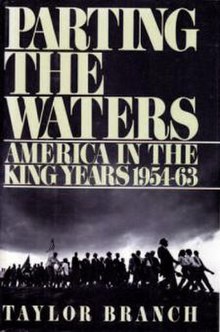America in the King Years
 |
|
| Author | Taylor Branch |
|---|---|
| Country | United States |
| Language | English |
| Series | America in the King Years |
| Subject |
Martin Luther King Jr., Civil Rights Movement |
| Genre | Biography |
| Publisher | Simon & Schuster |
|
Publication date
|
1988 |
| Media type | |
| Pages | 1,088 |
| ISBN | |
| OCLC | 18383661 |
|
Publication date
|
1998 |
|---|---|
| Pages | 768 |
| ISBN | |
| OCLC | 37909869 |
|
Publication date
|
2006 |
|---|---|
| Pages | 1,056 |
| ISBN | |
| OCLC | 62118415 |
America in the King Years is a three-volume history of Martin Luther King Jr. and the Civil Rights Movement by Taylor Branch, which he wrote between 1982 and 2006. The three individual volumes have won a variety of awards, including the 1989 Pulitzer Prize for History.
The titles of the three volumes, Parting the Waters, Pillar of Fire, and At Canaan's Edge, were all drawn from aspects of the Old Testament Book of Exodus – namely, the Crossing of the Red Sea, the manifestation of God that allowed the Israelites to travel by night, and the Promised Land, which Moses was able to see into, but did not live long enough to enter.
A one-volume summary of the series was published in 2013.
In the early 1980s, Branch planned to spend three years writing about America during the civil rights era, focusing on Martin Luther King Jr. As Branch proceeded with his work, the project ended up becoming a 24-year endeavor.
Branch described his approach to writing the King trilogy as follows:
Storytelling--to do it in storytelling. I--one of the reasons I wanted to do it was that I knew this had an enormous impact, somewhat like the Civil War and Reconstruction period a century before. But most of the books I read seemed to me analytical and argumentative, reinventing new labels of analysis. And I felt that they didn't have the power to really describe what happened at the personal level, which is where I think we really learn about race across the divisions that we have.
And so I really resolved from some lessons out of my experience that I wanted to try to keep it at a storytelling level and follow the stories wherever they went. I just didn't know that there would be so many of them or that they would be from such broad context; that I'd be chronicling King's relationship with Rabbi Abraham Heschel or something like--you know, these are things that I didn't--had no way of anticipating. So I just kind of--I followed storytelling, but it tumbled me off into more worlds than I'd planned on.
...
Wikipedia
